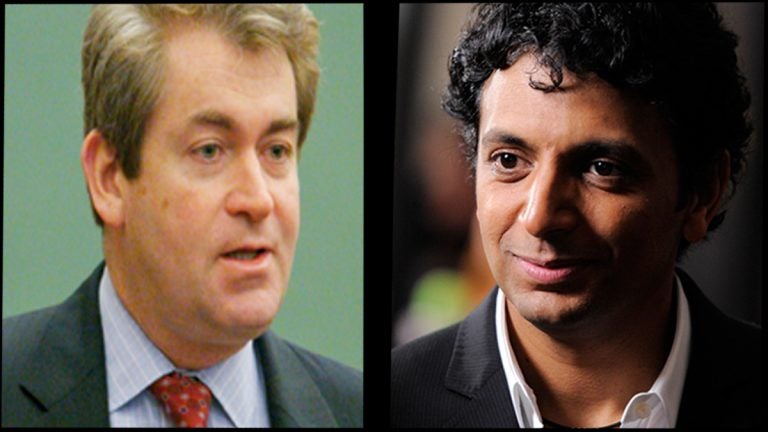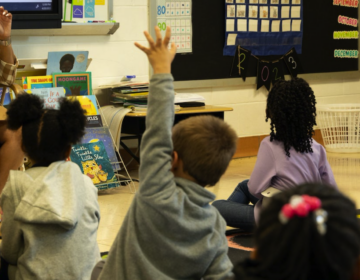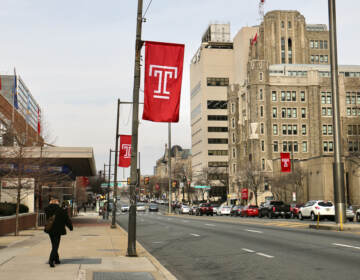Philly SRC appointee Green says M. Night Shyamalan’s education-reform book ‘shaped thinking’

Bill Green’s views on education have evolved, thanks in part to research put forth by filmmaker and author M. Night Shyamalan.
Before being nominated by Gov. Tom Corbett to chair the Philadelphia School Reform Commission, City Councilman Bill Green released two policy papers outlining his views for how to “repair public education.”
In them, he envisioned a “recovery school district” model (similar to what’s currently in place in Louisiana) that, in effect, would create two distinct landscapes of public education in Philadelphia.
One landscape would include the district’s well-performing schools, and the other would comprise the district’s “failing” schools
The former would be managed by a local school board appointed by the mayor; the latter would be managed by a intensive turnaround team overseen by the Pennsylvania Department of Education.
In comparing his proposal to Louisiana’s recovery school district model, Green championed the idea of allowing a large portion of the Philadelphia School District to be “managed through nontraditional means, such as charter operators or private managers.”
Since those papers were released, Green said his views have evolved. He now believes that positive change can occur by keeping schools under the management of the Philadelphia School District.
So what changed his mind?
In no small part, M. Night Shyamalan.
Identifying the ‘five keys’
The filmmaker known better for his Hollywood surprise endings released a book in September titled, “How I Got Schooled: The Unlikely Story of How a Moonlighting Moviemaker Learned the Five Keys to Closing the Education Gap.”
In a telephone interview Tuesday, Green described the book as a “compendium of all of the best research on urban education over the last 50 years.” He said it “helped shape the views I hold today,” and “reframed some of my thinking from my earlier policy papers.”
Shyamalan says he spent five years working on the book after a location scout for a film he was shooting in Philadelphia brought him up close and personal with issues of education inequity.
He visited two Philadelphia School District high schools: the esteemed selective-admission magnet school J.R. Masterman and the comprehensive come what may Overbrook High School.
Seeing the “stark differences,” Shyamalan said he put aside his preconceived opinions and began to pore over a half-century’s worth of empirical research on education.
In the book, he said, he’s simply created a “big list.”
“The first knee-jerk reaction to somebody hearing that a person who is known for movies is actually involved in something to do with education reform, it seems like a head scratcher, and rightfully so,” said Shyamalan. “But all it was was me making a list of what other people have proven in their research.”
Shyamalan’s five keys, which he stresses must be employed in concert, consist of:
identifying great teachers and removing “roadblock teachers” (new teachers should have two to three years before removal);
promoting instructional leadership;
providing consistent feedback on teaching practice;
reducing school size;
adding more time (longer days/longer years).
His research found little correlation between academic improvement and smaller class sizes.
“If we’re killing ourselves to move a classroom from 25 to 21 [students], that’s going to do nothing … and cost a lot of money,” he said. “If [you could choose between] a great teacher with 30 kids and an average teacher with 11 kids, which class should you put your kid in? It’s a no-brainer. It’s the 30.”
Green acknowledged specifically that Shyamalan’s book helped him see that “it does not matter whether or not a school is a public school or public charter school or any other kind of school in an urban area. If these five things are present, it can be successful.”
The plans of Philadelphia Superintendent William Hite, said Green, “include all of what is recommended in that book plus some more.” (The Philadelphia School District did not respond in time to confirm this).
‘Specialized group’
In researching the book, Shyamalan said he didn’t pick a side in what’s often reduced to a binary battle between teachers unions and education reformers. Both, he said, have made good and bad arguments.
The larger point is that everyone must approach education differently when it comes to trying to close the achievement gap for the nation’s urban minorities, he said.
“The teaching of that group in our schools is a different type of teaching. If everything were equal, if all kids were coming in like white suburban kids … we have a pretty good system in place to teach everybody, and those teachers and principals are more than adequate to do the job and teach our kids really well,” said Shyamalan. “This particular group is a specialized group that needs specialized training and teaching to counteract the message that they’re getting outside of these schools.”
That message, which Shyamalan said “used to be screamed and is now being whispered,” from society to urban minority students is that “there [are] no opportunities. This country is not for you. You’re worthless. You are something below us and don’t belong.”
On Green’s nomination, Shyamalan, a resident of the Philadelphia area, said he was “super, super psyched that someone that will have power will actually be coming, not from opinion, but from data. It’s a wonderful, wonderful thing for our city because I want our city to be the leading model for the country – which it once was. We’re the opposite right now, and that’s got to change.”
Shyamalan will be at The Baldwin School Wednesday night discussing his research and signing books.
Here’s a link to an interview Shyamalan did with HuffPost live in September.
WHYY is your source for fact-based, in-depth journalism and information. As a nonprofit organization, we rely on financial support from readers like you. Please give today.





